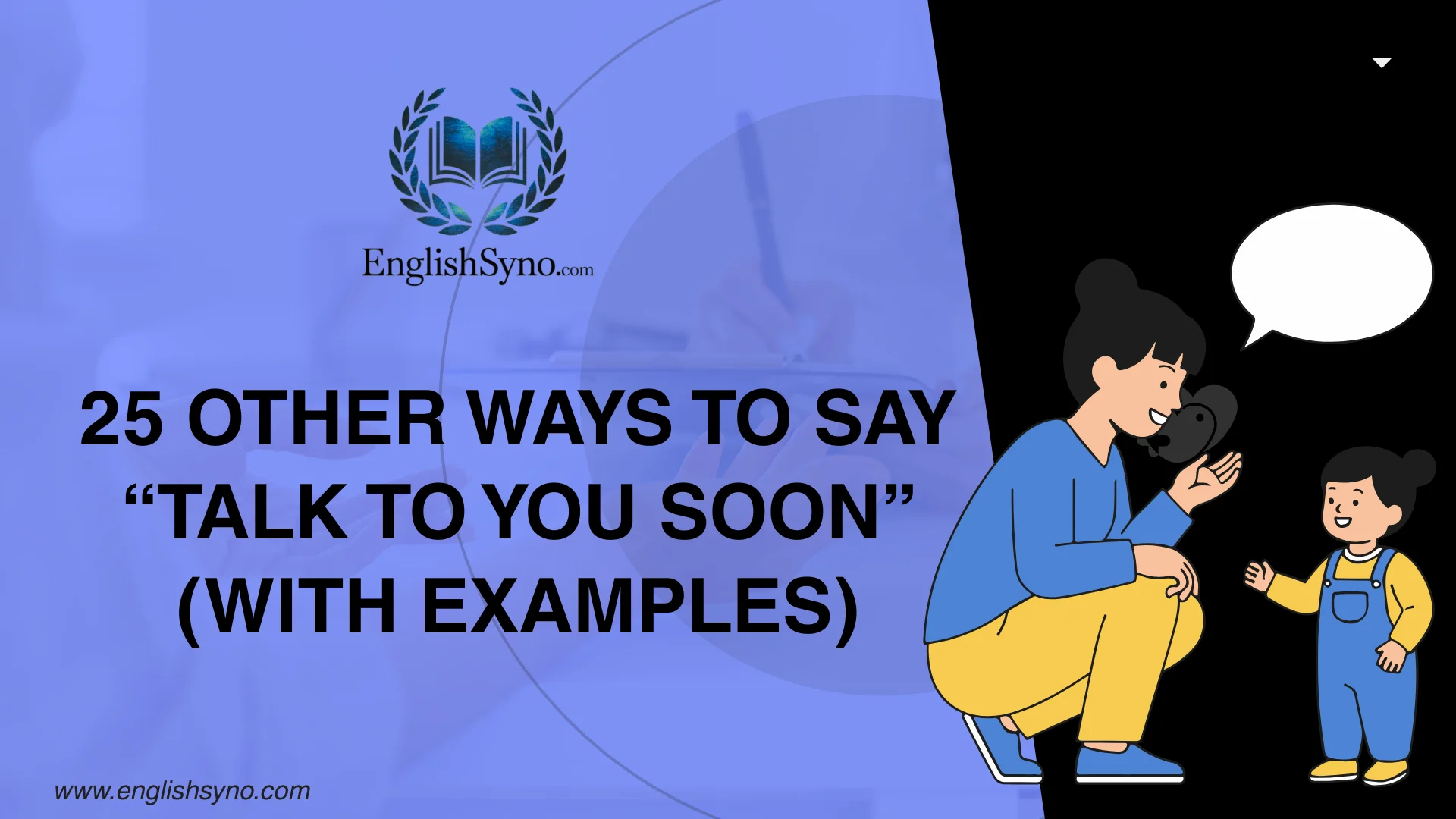When you talk to you soon in emails or messages, it’s more than just an informal phrase indicating your desire to speak with someone again in the near future, which I’ve often used as a polite way to end a conversation while showing commitment to prompt follow-up communication.
Its use creates immediate expectation for reconnection, compared to later, which can imply an indefinite timeframe; sincerity depends on the relationship, context, body language, and speaker. I’ve ever noticed how default wrapping a chat feels comfortable, familiar, yet sometimes feels like a verbal handshake on autopilot.
Let’s explore creative alternatives that’ll make goodbyes meaningful and memorable; in professional settings, it walks a fine line between casual and formal, generally acceptable if your choice of closing should match key sign off difference; seems too for certain situations, don’t worry, we’ve gathered 10 helpful options, explained with examples, guide choosing best one next comes to professionalism, courtesy, and words that matter; I’ve considered a lot, however, its formality depends on the recipient, less other sign-offs are friendly and implies a quick have established likely continue, while avoided first-time communications may indicate hope or wish sooner rather than later; it might there not set time, would happen, although shorter period like a day, so also unfinished business return, usually know the person, least fairly well, and chances of repeat exists; it’s positive when I stop now for a good reason, pick again, and other will therefore effort further to communicate.
What Does “talk to you soon” Mean?
Definition & Meaning: Saying “talk to you soon” communicates a desire to connect with someone again in the near future, signaling interest, care, and the intention to maintain the relationship.
Detailed Explanation: It’s typically used to close a conversation or message politely while suggesting a quick follow-up. The tone is usually friendly, informal, and sometimes slightly casual, depending on context.
When to Use “talk to you soon”
Definition & Meaning: Ideal for situations when you want to reconnect without committing to a specific time.
Detailed Explanation: It conveys sincerity and interest while remaining polite. Suitable for messages, emails, and casual conversations.
Is It Professional/Polite to say “talk to you soon”?
Definition & Meaning: Generally acceptable in professional contexts where a friendly tone is appropriate.
Detailed Explanation: Can be used in emails, Slack messages, or informal professional chats. Not suitable for strict formal communications.
Pros and Cons
Pros: Conveys friendliness, interest, and willingness to continue communication. Signals warmth and approachability.
Cons: Too casual for some professional contexts; may lack specificity on timeframe; can be perceived as vague.
Chat later
Definition & Meaning: An Informal way to suggest reconnecting.
Detailed Explanation: Suggests a follow-up conversation without a fixed time.
Example: “It was great catching up. Chat later!”
Best Use: Friends, casual colleagues.
Worst Use: Formal emails.
Tone: Informal, friendly.
Catch up soon
Definition & Meaning: Expresses interest in reconnecting.
Detailed Explanation: Implies maintaining the relationship and continuing discussion.
Example: “Let’s catch up soon over coffee.”
Best Use: Personal or casual professional interactions.
Worst Use: Formal business communications.
Tone: Friendly, warm.
Speak soon
Definition & Meaning: Polite and slightly professional alternative.
Detailed Explanation: Works in emails or calls, signaling intention to reconnect.
Example: “Thanks for your input. Speak soon!”
Best Use: Colleagues, acquaintances.
Worst Use: Very formal or legal messages.
Tone: Polite, professional.
Talk later
Definition & Meaning: Slightly casual, suggests follow-up.
Detailed Explanation: Indicates conversation will continue later without specifying a time.
Example: “I have to run, talk later!”
Best Use: Friends or informal chats.
Worst Use: Formal emails.
Tone: Casual, friendly.
Connect soon
Definition & Meaning: Professional and polite, it implies staying in touch.
Detailed Explanation: Useful for business emails or networking.
Example: “Let’s connect soon to discuss the project.”
Best Use: Professional follow-ups, networking.
Worst Use: Casual social chats.
Tone: Professional, polite.
Keep in touch
Definition & Meaning: Suggests ongoing communication.
Detailed Explanation: Can be friendly or professional; signals care about the relationship.
Example: “It’s been great working with you. Keep in touch!”
Best Use: End of collaboration, friends, colleagues.
Worst Use: When urgency is required.
Tone: Friendly, approachable.
Catch you later
Definition & Meaning: A Very informal, casual way to say goodbye with the intention to reconnect.
Detailed Explanation: Works well in text messages or casual conversation.
Example: “I’m heading out now. Catch you later!”
Best Use: Friends, peers.
Worst Use: Professional or formal messages.
Tone: Casual, informal.
Talk soonish
Definition & Meaning: Informal, playful tone for upcoming conversation.
Detailed Explanation: Adds a friendly, slightly humorous touch.
Example: “Let’s talk soonish about the weekend plans.”
Best Use: Friends, casual colleagues.
Worst Use: Formal professional context.
Tone: Informal, lighthearted.
Touch base soon
Definition & Meaning: Professional, signals intention to reconnect.
Detailed Explanation: Common in business communications, implies follow-up discussion.
Example: “I’ll touch base soon regarding the report.”
Best Use: Work-related emails or meetings.
Worst Use: Casual personal chats.
Tone: Professional, polite.
Ping you later
Definition & Meaning: Informal, modern digital communication phrase.
Detailed Explanation: Suggests reconnecting via messaging or email.
Example: “I’ll ping you later with the details.”
Best Use: Friends, colleagues in a tech-friendly environment.
Worst Use: Formal emails.
Tone: Informal, friendly.
Circle back soon
Definition & Meaning: A Professional term for returning to a topic.
Detailed Explanation: Often used in business meetings or emails to indicate follow-up.
Example: “Let’s circle back soon on the budget.”
Best Use: Work or project discussions.
Worst Use: Social messages.
Tone: Professional, neutral.
Speak with you shortly
Definition & Meaning: Polite, semi-formal, implies near-future conversation.
Detailed Explanation: Indicates follow-up is expected soon.
Example: “I’ll speak with you shortly about the proposal.”
Best Use: Professional calls or emails.
Worst Use: Casual texts.
Tone: Polite, professional.
Let’s reconnect soon
Definition & Meaning: Friendly, professional, or semi-formal way to express desire to continue conversation.
Detailed Explanation: Shows thoughtfulness and engagement.
Example: “We should reconnect soon to review the project.”
Best Use: Networking, teamwork, friendly meetings.
Worst Use: Urgent messages needing immediate response.
Tone: Warm, professional.
Talk in a bit
Definition & Meaning: Casual, informal, short-term follow-up.
Detailed Explanation: Used for imminent or same-day conversations.
Example: “I need a quick break. Talk in a bit!”
Best Use: Texts, instant messaging.
Worst Use: Formal emails.
Tone: Casual, friendly.
Keep talking soon
Definition & Meaning: Friendly implies ongoing communication.
Detailed Explanation: Often used to maintain rapport.
Example: “I enjoyed our chat. Keep talking soon!”
Best Use: Friends or close colleagues.
Worst Use: Formal or first-time emails.
Tone: Friendly, warm.
Message you soon
Definition & Meaning: Informal, digital follow-up communication.
Detailed Explanation: Suggest sending a message shortly.
Example: “I’ll message you soon with updates.”
Best Use: Texts or emails to familiar contacts.
Worst Use: Formal or official communication.
Tone: Informal, approachable.
Let’s chat soon
Definition & Meaning: Friendly and warm invitation to continue the conversation.
Detailed Explanation: Can be used in both personal and professional contexts, depending on tone.
Example: “I enjoyed today. Let’s chat soon!”
Best Use: Friends, coworkers.
Worst Use: Highly formal situations.
Tone: Warm, friendly.
Talk again soon
Definition & Meaning: Polite way to express intent to reconnect.
Detailed Explanation: Works for both professional and personal contexts.
Example: “Thanks for your help. Talk again soon.”
Best Use: Emails, chats with colleagues or friends.
Worst Use: Strictly formal messages.
Tone: Polite, friendly.
Check in soon
Definition & Meaning: Professional, conveys follow-up intention.
Detailed Explanation: Often used in team or project updates.
Example: “I’ll check in soon on the status.”
Best Use: Work or management communications.
Worst Use: Casual, social chats.
Tone: Professional, polite.
Catch you shortly
Definition & Meaning: Informal, near-term follow-up.
Detailed Explanation: Works for calls, texts, or quick emails.
Example: “I’m on my way. Catch you shortly.”
Best Use: Immediate conversation or casual check-ins.
Worst Use: Formal emails.
Tone: Casual, friendly.
Speak with you soon
Definition & Meaning: Polite, semi-formal follow-up.
Detailed Explanation: Good for emails and calls indicating near-future contact.
Example: “I’ll speak with you soon about the project.”
Best Use: Professional emails, calls.
Worst Use: Casual texts.
Tone: Polite, professional.
Touch base shortly
Definition & Meaning: Professional, signals quick follow-up.
Detailed Explanation: Often used in workplace communications.
Example: “Let’s touch base shortly on the report.”
Best Use: Workplace emails, project updates.
Worst Use: Social messages.
Tone: Professional, neutral.
Connect with you soon
Definition & Meaning: Friendly, professional alternative.
Detailed Explanation: Shows intent to maintain communication.
Example: “I’ll connect with you soon to discuss next steps.”
Best Use: Networking or work follow-ups.
Worst Use: Casual instant messages.
Tone: Polite, professional.
Talk again later
Definition & Meaning: Casual, friendly follow-up.
Detailed Explanation: Implies ongoing conversation in the future.
Example: “It’s been great. Talk again later.”
Best Use: Friends, informal chats.
Worst Use: Formal correspondence.
Tone: Casual, friendly.
Check back soon
Definition & Meaning: Professional, suggests follow-up action.
Detailed Explanation: Can indicate checking progress, updates, or returning to a topic.
Example: “I’ll check back soon on the project.”
Best Use: Work or project-related communication.
Worst Use: Informal social conversations.
Tone: Professional, polite.
Final Thoughts
Finding the right words to say “talk to you soon” can make a world of difference in how your messages are received. Using alternative phrases allows you to convey warmth, care, and genuine interest in staying connected, whether with friends, colleagues, or professional contacts. Each alternative has its own nuance: some are casual and playful, perfect for friends or peers, while others are polite and semi-professional, ideal for emails or business communication. Understanding the context, your relationship with the recipient, and the tone you wish to convey ensures that your message feels thoughtful and intentional.
Incorporating these variations also prevents your communication from sounding repetitive or automatic, giving each interaction a more personal touch. For instance, phrases like “catch up soon” or “let’s reconnect soon” show a deliberate effort to maintain contact, while professional alternatives such as “touch base shortly” or “connect soon” maintain politeness and courtesy in workplace conversations. Remember, timing matters: using a phrase too casually in a formal context may appear unprofessional, while overly formal phrases in casual chats may feel stiff.
Ultimately, the goal is to express care, consideration, and a desire to continue the conversation without imposing pressure. By choosing the right phrase, you make your messages feel meaningful, memorable, and authentic, leaving the recipient with a positive impression and reinforcing your connection. Experiment with these alternatives to suit your style, audience, and purpose, and watch your communication become more engaging and effective.
FAQs
What does “talk to you soon” mean?
It means you want to reconnect with someone in the near future. It’s a friendly, polite way to end a conversation while showing interest in continuing communication.
Is it professional to say “talk to you soon”?
Yes, in casual or semi-formal professional settings. It conveys approachability but may be too informal for strict formal emails or legal communications.
When should I use “talk to you soon”?
Use it when you want to end a conversation politely and indicate a future follow-up, such as emails, text messages, or casual calls.
Can I use it in formal emails?
It’s best used in semi-professional contexts. For highly formal emails, alternatives like “connect soon” or “touch base shortly” are preferable.
How can I make “talk to you soon” sound more personal?
Pair it with a friendly message or personalized note about your previous conversation. Adding context makes it warm and meaningful.
What are casual alternatives?
Phrases like “catch you later”, “chat later”, or “talk again soon” are ideal for informal conversations with friends or peers.
What are professional alternatives?
Use “touch base shortly”, “connect soon”, or “speak with you shortly” for workplace emails and professional interactions.
Is tone important when using this phrase?
Absolutely. Your tone communicates sincerity and intent. A casual tone works for friends, while a polite tone suits professional contexts.
Can I use it in text messages?
Yes, it’s widely acceptable in SMS, WhatsApp, or other messaging platforms to indicate follow-up without pressure.
Does “talk to you soon” imply urgency?
Not necessarily. It suggests near-future contact but does not set a strict timeframe. For urgent matters, specify timing.
Can it be used in phone calls?
Yes, it’s common to close casual or professional phone calls with this phrase to indicate interest in reconnecting.
Will it work in first-time communications?
It’s less suitable for first-time interactions where a formal tone is expected. Use “connect soon” instead.
What’s the difference between “talk to you soon” and “talk later”?
“Talk later” is more casual and vague, while “talk to you soon” conveys warmth and intent to maintain a connection.
How do I make it memorable in emails?
Pair it with a thoughtful sentence, such as reflecting on your discussion or adding a personal touch.
Can this phrase enhance relationships?
Yes. Using thoughtful variations shows care, consideration, and interest in ongoing communication, strengthening bonds personally and professionally.

Muhammad Altaf is an English language specialist and professional content strategist with over 10 years of experience writing and teaching practical English usage, professional communication, and tone awareness. His work focuses on helping readers express ideas clearly, naturally, and confidently in real-world contexts.


